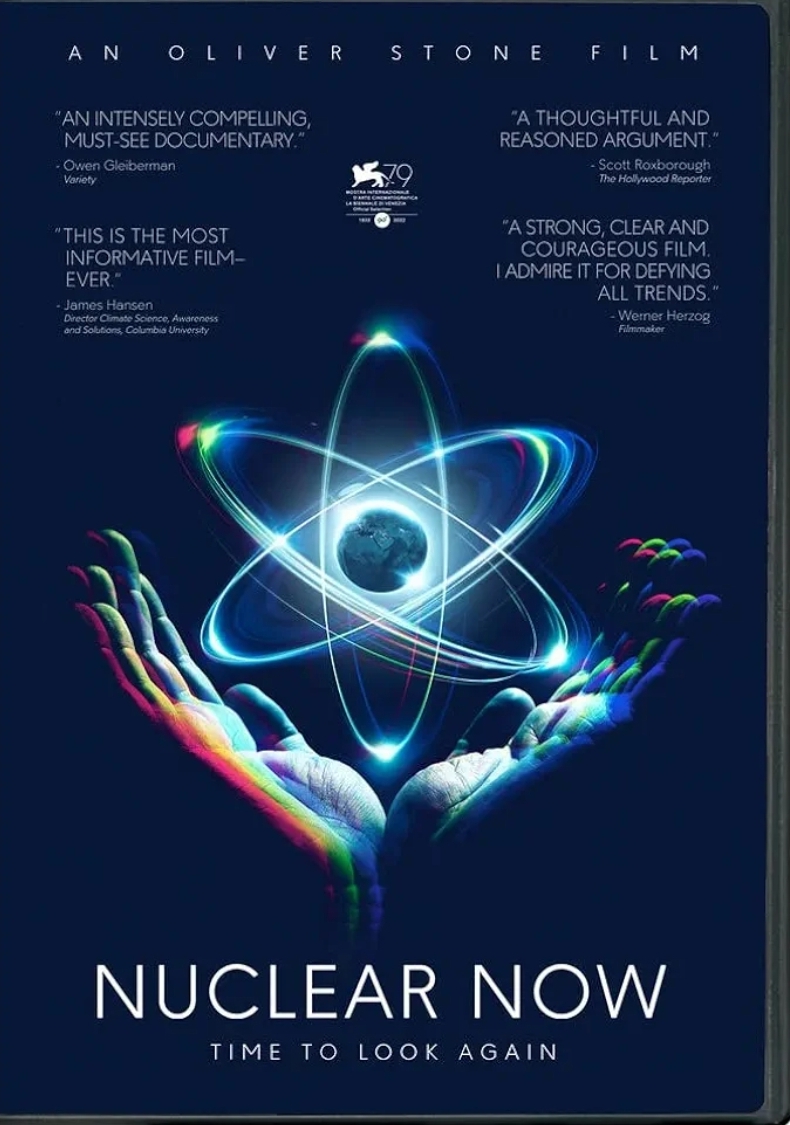“Nuclear Now” is a documentary directed by Oliver Stone that advocates for nuclear energy as a viable solution to address the growing global energy crisis and mitigate climate change. The film is based on the book A Bright Future: How Some Countries Have Solved Climate Change and the Rest Can Follow by Joshua S. Goldstein and Staffan A. Qvist. It explores the potential of nuclear power to provide clean, safe, and efficient energy, countering misconceptions about its dangers.
Overview and Themes
- The Energy Crisis and Climate Change:
- The documentary begins by addressing the urgency of the global energy crisis, exacerbated by climate change. It highlights the role of fossil fuels in causing environmental destruction, pollution, and global warming.
- Stone emphasizes the inadequacy of renewable energy sources like wind and solar alone in meeting the energy needs of a growing population while reducing carbon emissions.
- The Case for Nuclear Energy:
- Stone presents nuclear energy as a clean, efficient, and reliable source of power. The film argues that nuclear energy can significantly reduce carbon emissions while providing a steady energy supply that renewables cannot consistently achieve due to their intermittency.
- The film explores advancements in nuclear technology, including next-generation reactors that are safer and more efficient than older models.
- Stone delves into the successful use of nuclear power in countries like France and Sweden, which have transitioned to nuclear energy to meet their energy demands while cutting greenhouse gas emissions.
- Safety Concerns and Public Perception:
- The documentary tackles public fears surrounding nuclear energy, largely driven by accidents like Chernobyl (1986), Three Mile Island (1979), and Fukushima (2011).
- Experts featured in the film argue that nuclear energy is much safer than most people believe, citing statistics on the low incidence of nuclear accidents compared to the catastrophic impacts of coal, oil, and gas.
- Stone also highlights improvements in safety protocols and technology that make modern nuclear plants much less prone to accidents.
- The Political and Economic Obstacles:
- Stone examines the political and economic barriers to nuclear energy, including the influence of fossil fuel industries and the negative public perception of nuclear power.
- The documentary also looks at the regulatory challenges and high upfront costs of building nuclear power plants, despite their long-term economic benefits.
- A Call for Action:
- Stone advocates for a reconsideration of nuclear energy on a global scale. He argues that the world cannot rely solely on renewable energy sources and that nuclear power must be part of the solution to meet energy needs and combat climate change.
- The film urges policymakers, environmentalists, and the public to embrace nuclear energy as a necessary component of the fight against climate change.
Key Figures and Contributions:
- Joshua S. Goldstein and Staffan A. Qvist, the authors of A Bright Future, are prominent contributors to the film, providing scientific insights and data on how nuclear energy can be part of the global energy transition.
- Scientists, energy experts, and environmentalists also offer perspectives, sharing their knowledge on nuclear technology, the environmental impacts of fossil fuels, and the potential of nuclear power to create a sustainable future.
Visual and Cinematic Elements:
- Oliver Stone’s documentary style is informative and visually engaging, using archival footage, animations, and interviews to explain complex scientific and technical concepts in an accessible manner.
- The film also includes historical context, showing the development of nuclear technology and the early optimism surrounding it, before public fears and political factors led to its decline.
“Nuclear Now” challenges viewers to reconsider nuclear energy as a clean and viable solution to the energy crisis and climate change. Stone argues that nuclear energy’s potential far outweighs its risks, especially in the context of a rapidly warming planet. The documentary advocates for a balanced energy strategy that includes nuclear power, urging policymakers and the public to move beyond fear and misinformation to embrace a future powered by nuclear energy.
In Oliver Stone’s “Nuclear Now,” the documentary suggests that multiple groups and industries have benefited from the closure or suppression of nuclear energy, despite its potential as a clean and reliable energy source. These beneficiaries often have vested interests in other forms of energy production or political motivations that align with anti-nuclear sentiments. Below are some of the key groups that Stone highlights as benefiting from the reduction or stagnation of nuclear power:
1. Fossil Fuel Industry
- Oil, gas, and coal companies stand to benefit the most from the decline of nuclear energy, as they continue to dominate the global energy market. With nuclear energy being sidelined, the demand for fossil fuels remains high, allowing these companies to maintain profitability and market control.
- Fossil fuel companies have historically lobbied against nuclear energy because it poses a threat to their economic interests. By discouraging investment in nuclear power, these industries maintain their dominance in energy production.
2. Renewable Energy Industry
- Although renewables like wind, solar, and hydro are generally seen as part of the solution to climate change, some segments of the renewable energy industry benefit from anti-nuclear sentiment. If nuclear energy were more widely accepted, it could compete with renewable energy for government subsidies, investments, and public support.
- Stone argues that while renewables are crucial, they cannot replace fossil fuels entirely due to their intermittency. However, the renewable energy industry benefits from the perception that it is the only clean alternative, diverting attention from nuclear power.
3. Environmental Groups Opposed to Nuclear Energy
- Certain environmental organizations have played a significant role in turning public opinion against nuclear energy. These groups, particularly in the 1970s and 1980s, amplified fears about nuclear accidents (like Chernobyl and Fukushima) and concerns over nuclear waste.
- While many environmentalists are motivated by genuine concerns about safety, Stone suggests that some groups benefit from maintaining a monopoly on public advocacy for clean energy, with an over-reliance on renewables and underestimation of nuclear energy’s potential.
4. Politicians and Policymakers
- Politicians who advocate for the closure of nuclear plants often benefit from the alignment with populist anti-nuclear movements. They gain public support by siding with environmental concerns, even though, as Stone argues, this often works against long-term environmental solutions like nuclear energy.
- Policymakers also benefit from maintaining the status quo of fossil fuel reliance, as the industry is deeply embedded in political systems through lobbying and campaign financing.
5. Nuclear Energy Competitors in Global Energy Markets
- Nations and corporations involved in competing energy markets can also benefit from the decline of nuclear power. For example, countries with large fossil fuel exports may prefer to see nuclear energy restricted globally so that they can continue to dominate the international energy trade.
- Similarly, companies focused on natural gas production and distribution, especially as gas has been promoted as a “bridge fuel” between coal and renewables, benefit when nuclear power is not in the mix.
6. Media and Public Misinformation
- The media has played a role in sensationalizing nuclear accidents, focusing heavily on disasters like Chernobyl and Fukushima, which stoked public fears and created strong anti-nuclear sentiment. This narrative benefits those who wish to undermine the legitimacy of nuclear energy as a safe, viable option.
- Stone suggests that public misinformation about the safety, efficiency, and environmental impact of nuclear energy benefits industries and political agendas that want to prevent nuclear from being a serious competitor.
7. Military-Industrial Complex (Indirectly)
- Although not a direct beneficiary of nuclear power closures, the military-industrial complex has a vested interest in maintaining focus on nuclear weapons rather than nuclear energy. By keeping the two issues intertwined in public perception, it is easier to drum up opposition to peaceful nuclear energy programs.
- The conflation of nuclear weapons with nuclear power has further damaged the reputation of nuclear energy, benefiting other industries by reducing the political will to invest in civilian nuclear infrastructure.
Oliver Stone’s “Nuclear Now” argues that the decline of nuclear power benefits fossil fuel industries, renewable energy advocates, and political actors who have a stake in keeping nuclear energy out of the conversation. These groups are able to maintain their economic and political power by sidelining what Stone sees as a key solution to the global energy crisis and climate change. The film contends that a combination of lobbying, misinformation, and public fear has allowed these interests to keep nuclear power from reaching its full potential as a clean, efficient, and scalable energy source.






